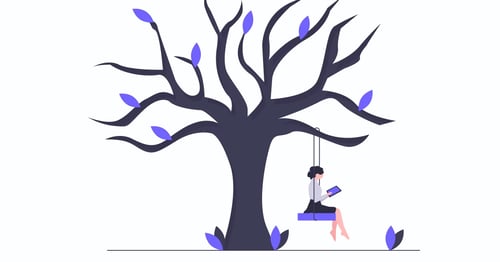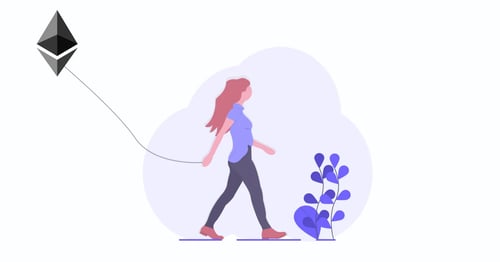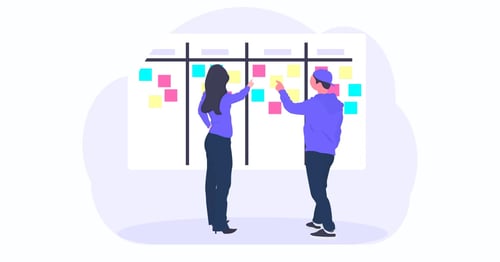Mind Over Matter: Shifting Mindset and Mood to Increase Productivity

Depression and anxiety costs the global economy an estimated US$ 1 trillion per year in lost productivity, according to World Health Organisation figures published last month.
Whilst such labels aren’t common parlance in the legal profession, The Guardian newspaper reported a year before that Barristers in England and Wales were “in the grip of a mental health crisis.”
A survey for The Bar Council revealed that nearly half of participating counsel said they worked over 60 hours and only 50% said they felt able to balance their home and work lives. The consequent negative impact on wellbeing is obvious.
"Taking effective actions to promote wellness in the workplace clearly benefits productivity, given that for every US$ 1 put into scaled up treatment for common mental disorders, the WHO statistics assert there is a US$ 4 return in improved health and productivity."
So what effective actions to promote well-being and benefit productivity can YOU take, whether as a Law Firm or as a lawyer yourself?
Mindset
Let's look at some tips and tricks of structuring your mindset in a way that will help boosting your workplace productivity as a lawyer.
Adopt a positive mindset

Whether individually or collectively, look at thoughts, words AND behaviour and consider whether there are positive adjustments to be made which would more positively affect outcomes.
Clients often come to me with Imposter Syndrome – that fear of getting found out or not being good enough. A simple exercise we do with them is creating a Success Board, detailing all their past achievements to remind them of just how valuable and already successful they are. This works wonders for their mindset, and steels them to approach career progression opportunities more positively.
Law firms and Chambers can work together on inclusive, supportive cultures through positive values and shared mission statements from administrative staff right up to the CEOs/ Equity partners.
Positive thoughts without positive actions lead to positively nothing.
Check your focus

Whatever you dwell on you bring into sharper focus, for good or bad, positive or negative.
Tony Robbins in Notes from a Friend, sets a 10 Day Mental Challenge to “train your brain” into having more consistently positive thoughts. You only have to think about labelling a frustrating morning on route to work as “one of those days” to think how quickly one negative thought compounds another. So, the end result you get is that overwhelmingly bad day.
Just as quickly as we spiral downwards, train your thoughts to the positive and see instantly improved results. For example, in a challenging situation, see the learning opportunities as opposed to the frustrating obstacles.
Practice Gratitude

Start your day with gratitude as opposed to the mobile phone social media “death scroll.” Think of, and even journal, a couple of things that make you feel grateful.
This will give you a pro-active sense of your own purpose and owning your own day before you allow in the reactive distractions of the digital world: your family, a sunrise, the peace in an early morning.
Likewise, even in the moments of extreme pressure and stress, on the commute home for example, be grateful for a beautiful sunset, your favourite song playing on the radio, your friends/ family.
"Be amazed at how quickly focusing on the positives can put into perspective, and most importantly reduce the extent of, the negatives."
As an organisation, incorporate gratitude into the culture: employee recognition and rewards could assist here, along with a transparent appraisal system.
I spoke to an associate solicitor in a law firm recently voted “lawyer of the month.” Not only was she incentivised by the nomination but equally grateful: a winning combination for increasing her productivity.
Mood
Doing a couple of simple things to improve your mood can have a huge effect on the workplace productivity in your law firm. Let's dig deeper.
Smile

Over and above the thoughts we have, how about improving mood by behaviour? It may seem like the simplest of things, but how often when we are busy, stressed or overwhelmed do we take a moment to consciously smile?
Try it. The endorphins released around the body when you do have such an instantaneous effect, you can’t fail to feel, even temporarily, a changed and more positive mood.
Change your State

How many of us have experienced that afternoon eye flicker? The 3 pm graveyard slot in a trial where interviews are simply being read into the record for the jury, which you already know like the back of your hand. Paper pushing at your desk when you know you SHOULD be working and when your motivation to do so is low.
When you have an opportunity for “a natural break,” change your state. For the individual, get away from your immediate environment, move away from your desk, even go to the toilet and do some star jumps if you are able! Equally, playing your favourite song (with ear plugs if you are in open plan offices) can do wonders to boost and improve mood. This change in state works wonders for your energy levels, and alters how alert you feel.
For the organisation, lead by example. Encourage genuine chances for employees to leave their desks, better still, the office, when and if they want, for a proper lunch break for example.
Incorporating voluntary opportunities to exercise and access the outdoors in working days are frequently credited for an increase in performance, productivity and wellbeing.
Promote wellbeing/ social events such as yoga and team sporting get-togethers as being as integral and important part of the organisational ethos.
Watch you mouth!

I recall enjoying the usual robing room banter with Bar colleagues one morning at Court waiting for a case to be called on. There, I overheard countless lawyers greeting one another.
It caused me to reflect on how frequently it was that when asked “How are you?” barristers and solicitors reply “Busy”.
Not “Really well, thank you”, not “Happy, thanks” but “Busy” – as if their standing as a successful lawyer would in some way be diminished if they didn’t take every opportunity to tell their audience that their practice was thriving.
But how does “busy” really feel? Loaded, pressured, frenetic, even angst-ridden, at times. What happened to the person behind the Practice? Our ability to “simply be” without permanently engaging our “game face”? Think how language does or does not serves you.
I “need” as opposed to “choose” to work through lunch;
I “must” rather than I “want” to go to the gym.
Is what is coming out of your mouth adding to your own sense of overwhelm and consequently impacting on your productivity?
Work-Place Productivity
Once you have your mind and your mood set in the right way, it's time to organize your actual work processes. Here are some useful suggestions.
Distraction avoidance through focus & learning to say no

There can be no argument that the digital age has made the world a smaller and more accessible place; and that opportunities, in particular for women, to work flexibly within the legal profession (and be retained within it) have improved immeasurably with the rise in remote working.
Indeed, technology and innovation have huge potential, harnessed in the right way, for increasing productivity and boosting life balance. Taking the time now to learn something new may actually reap massive benefits later in terms of time-saving processes, diary management, marketing and the like.
The unexpected cost to our wellbeing, however, has been the insidious encroachment into our personal time of work calls and emails as we make ourselves more readily available and contactable 24/7, 365/12.
The ease with which we can “switch off” in the true sense of the words these days, even when we are on holiday, has been seriously compromised.
So how do we re-establish boundaries?
Firstly, decide what level of interruption you are prepared for, and plan accordingly.
As Jim Rohn, American Motivational Speaker, said “You run the day or the day runs you.” He emphasised the importance of sticking to your own schedule as opposed to being blown off course by the distraction offered by others. Have a plan and stick to it; tick tasks off a realistic to-do list if it helps, and most of all, tackle the trickiest stuff first to avoid procrastination and get the job done.
Eat That Frog by Brian Tracy is a great book to read on this topic. To this end, consider allocating 2 or 3 specific times in the day to check emails/ social media, and in between times, remove notification sounds/ alerts/ banners from all your devices.
Consider engaging your “Out of office” notifications at set times in the working day as opposed to simply for when you are away. For tasks which require complete and extreme immersion, “airplane mode” can be used to good effect.
Organisations can support employee engagement here by creating a culture which is respectful of boundaries and leads by example in terms of the expectations of the workforce.
Second, your should learn to say no.
So many of us struggle to say "no" for fear of appearing weak or unwilling to be a team player. I understand that trainee solicitors or pupil barristers, with their eye on a training contract or tenancy, might inadvertently become the “yes people”.
But the truth is, saying yes to everything frequently leads to doing lots of things badly rather than a few things well.
Consider:
- “Whose plan am I working to?”
- “To what am I prepared to say yes”
Then learn the art of saying no through repeated practice. For further reading around this topic, see Essentialism by Geoff McKeown.
Be present

In whatever you do, be fully “present.” Work whilst at work; have family time whilst with your family. If you do take work home, don’t be constantly on the phone dealing with work problems when you are with your children.
When working from home, sit yourself in an area where you can't become easily drawn in to domestic dramas. That way, you provide focus and clarity to you and those around you. It helps you manage your (and their) expectations, plus allows you to be more productive in the pockets of time dedicated to which ever specified activity.
When it comes to organizing activities of your teams, be the organisation that supports and facilitates employee focus – are the open plan office spaces working? How conducive to productivity is the working environment or culture? Have you surveyed staff on this lately?
Mindfulness through Time Blocking

Time blocking ensures that every task you put your mind to is in short, manageable bursts which you commit your full attention to: then when you are doing your work or you are with your family.
This way, you can give 100% attention as opposed to feeling constantly conflicted and distracted. It’s a form of workplace mindfulness.
In and amongst, take regular breaks and keep “proper” hours. That way, overwhelm can be avoided and productivity maintained.
Lead the change in your company
As an organisation, consider how employee mindfulness could be supported and encouraged. What is your culture and how more can it increase and promote a more mindful approach? Are your employees showing up mindful or with mind full?
About the author
Nikki Alderson is a former criminal barrister, now Corporate and Executive Coach supporting law firms and Chambers to attract and retain female talent within the legal profession and empowering female lawyers to achieve career ambitions whilst creating congruent lives.
Having gained great insights into the responsibilities, pressures and “expected” career paths of those, particularly women, working in law, Nikki sees a challenge within the profession, which she hopes to address through coaching, of retaining talented women role models, given the dearth of women in senior partnership roles and within the judiciary.
 By
By


